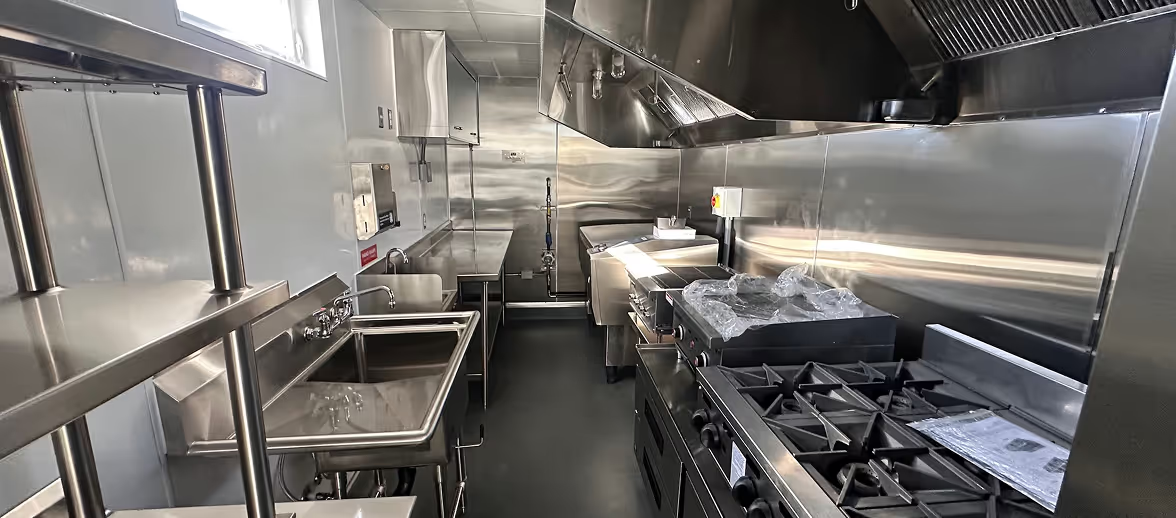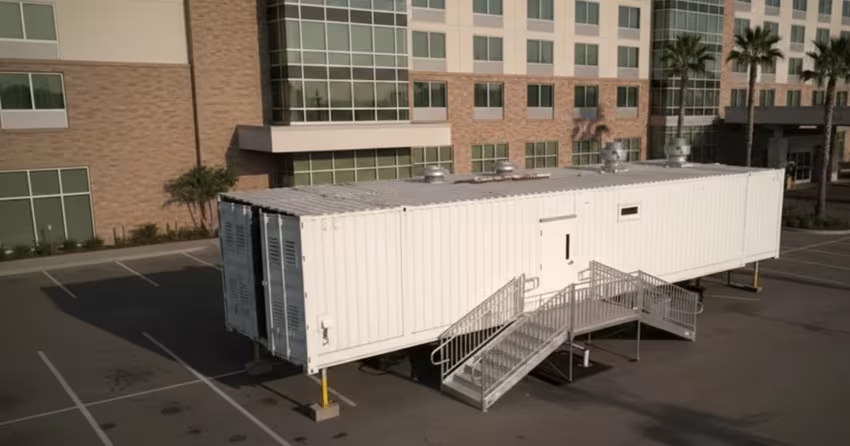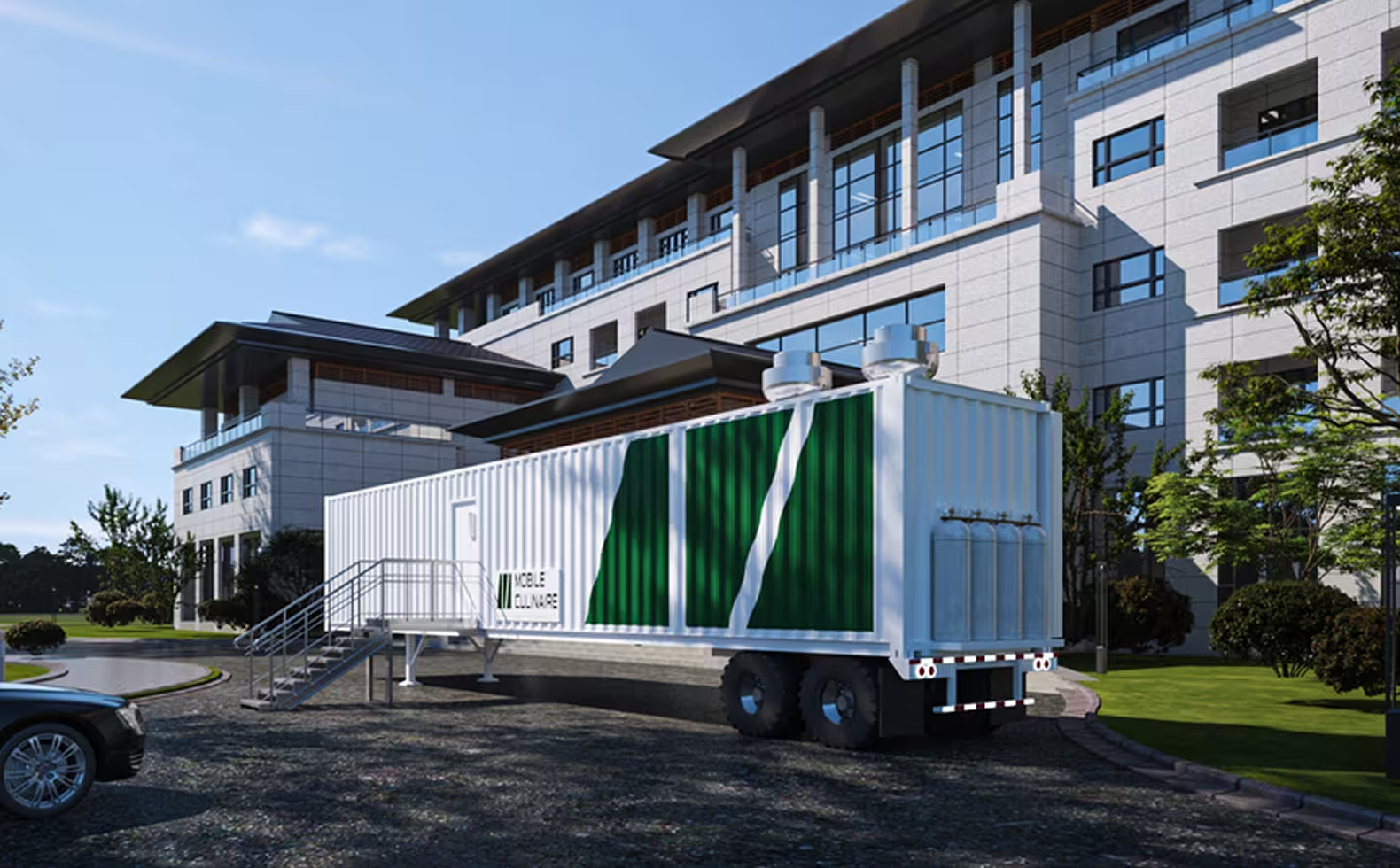%2520(1)%2520(1).avif)
Introduction
In Florida, every kitchen trailer typically licensed as a Mobile Food Dispensing Vehicle (MFDV) must meet licensing, sanitation, and fire safety requirements before it can legally operate. With Florida’s heat, humidity, heavy tourism, and dense event calendar, the stakes for food safety and equipment reliability are high. Operators who underestimate compliance risk delays, fines, or shutdowns. If you’re launching or scaling a mobile food operation, compliance isn’t optional, it’s your launchpad.
Success starts with approvals. Depending on your menu and operating model, you may work with the Florida Department of Business & Professional Regulation (DBPR), Florida Department of Health (DOH), Florida Department of Agriculture & Consumer Services (FDACS) (for certain business types), your local fire marshal under the Florida Fire Prevention Code (FFPC), and local zoning authorities.
This blog walks you through Florida kitchen trailer inspection checklist requirements step by step so you can prep once and pass cleanly.
Understanding Kitchen Trailer Regulations in Florida
Why Florida Has Tight Mobile Food Rules
Florida’s heat and humidity accelerate bacterial growth, while high foot traffic magnifies exposure risks. That’s why the state enforces strict temperature control, hygienic construction, approved utilities and commissaries, and fire protection standards (hoods, suppression systems, and LP-gas safety).
Florida also has one of the nation’s most active mobile food markets — over 8,000 licensed Mobile Food Dispensing Vehicles (MFDVs) as of 2025 — serving theme parks, beaches, and large events statewide. This high density of operations drives rigorous oversight to protect consumers and maintain food safety.
For operators, two key references set the foundation for sanitation and inspection: the Department of Health’s Food Hygiene Rule (Chapter 64E-11, F.A.C.) and the DBPR’s food temperature control chart. These documents align closely with the FDA Food Code and outline the criteria inspectors will use to assess compliance.
Agencies Involved in Kitchen Trailer Permits and Licenses
- DBPR – Division of Hotels & Restaurants (MFDVs)
The Florida Department of Business & Professional Regulation (DBPR) licenses Mobile Food Dispensing Vehicles (trailers, trucks, carts) and manages plan review, pre-opening inspections, and ongoing compliance.
Start with the DBPR MFDV Guide and the Plan Review Application (DBPR HR-7006).
Your submission must include:
- Scaled layout plans and labeled equipment list
- Menu and operational details
- Photo of the vehicle
- Approved water/sewer or commissary agreement
See the DBPR Plan Submittal FAQ for document specifics.
- Florida Department of Health (DOH)
The DOH enforces Chapter 64E-11, F.A.C. (Food Hygiene) and conducts risk-based inspection schedules. Their requirements mirror the FDA Food Code, focusing on temperature control, cooling methods, and employee hygiene.
Once DBPR approves your vehicle, DOH standards help govern daily food safety practices, especially during large events or commissary operations.
- FDACS (Agriculture & Consumer Services)
FDACS regulates mobile establishments that sell only prepackaged or non-TCS (Time/Temperature Control for Safety) foods, or that operate in retail or wholesale settings outside DBPR’s jurisdiction.
Their rules focus on labeling, packaging, and consumer protection rather than on-site cooking.
In short: DBPR handles open food service; FDACS handles prepackaged retail.
- Local Fire Marshal / Fire Department
Your local fire marshal enforces the Florida Fire Prevention Code (FFPC) — Florida’s adoption of NFPA 1 and NFPA 101, along with NFPA 96 (hoods/ventilation) and NFPA 58 (LP-gas).Expect inspections under NFPA 1 § 50.7, covering mobile and temporary cooking operations. Local departments often publish checklists mirroring these codes, such as:
Osceola County Mobile Cooking Checklist
Monroe County Fire Truck Requirements
- Florida Highway Safety & Motor Vehicles (FLHSMV) / State Statutes
While Florida does not require annual statewide vehicle inspections, kitchen trailers must still meet equipment and safety standards — brakes, lights, and reflectors under Chapter 316, Florida Statutes.
.avif)
Kitchen Trailer Inspection Requirements Checklist (Florida)
Use this pre-inspection checklist across build plan review, opening inspection, and ongoing compliance.
1. Structural & Sanitation Standards
- Floors, walls, ceilings: Smooth, non-absorbent, easily cleanable; seams and corners sealed; finishes specified in the DBPR Plan Review Form (HR-7006).
- Lighting: Adequate illumination; shielded or shatter-resistant bulbs above prep and cook areas.
- Handwashing sink: Dedicated hand sink with hot/cold water, soap, and paper towels, separate from warewashing, as required in the DBPR MFDV Guide.
- Warewashing: DBPR Opening Inspection Checklist mandates a 3-compartment sink with drainboards and sanitizer.
- Water supply & wastewater: Include documentation for an approved water/sewer or commissary in your DBPR Plan Submittal.
- Surfaces & equipment: Food-contact surfaces must be smooth, non-toxic, and cleanable; NSF-type equipment recommended per FDACS Minimum Construction Standards.
2. Food Trailer Equipment Compliance
- Commercial-grade appliances: All cooking and refrigeration equipment must be listed on your DBPR Plan Review submission.
- Temperature control:
- Cold holding ≤ 41°F; Hot holding ≥ 135°F (130°F for whole roasts) — see the DBPR Hot/Cold Holding Chart (5030-071).
- Cooling: 135°F → 70°F within 2 hours, then to 41°F within 6 hours; reheat ≥165°F for hot holding — per DBPR Cooling Chart (5030-070).
- Ventilation & suppression: Type I hood required over grease-producing appliances with a UL-300 wet-chem suppression system — enforced under the Florida Fire Prevention Code (FFPC) and NFPA 96.
- Pest prevention: Maintain sealed entry points, screened openings, and 6" clearance for stored food.
3. Utility Systems & Safety
- Plumbing: Proper traps, vents, and backflow prevention devices; potable lines protected and waste lines correctly sized per FDACS Construction Standards.
- Electrical: Must comply with the National Electrical Code (NEC); no exposed wiring and GFCI outlets installed where required.
- Power (generator or shore): Adequate load capacity and exhaust positioned away from intakes/openings.
- LP-Gas & fuel systems: Secure cylinders, approved hoses/regulators, manual shutoffs, and leak tests per NFPA 58 (2024) Chapter 16.
4. Fire & Life Safety (FFPC / NFPA 1, 96, 58)
- Fire extinguishers & suppression: Install and tag Class K extinguishers and automatic hood systems.
- Clearances: Maintain at least 10 ft from structures, vehicles, and combustibles; keep FD access clear.
- Egress & signage: Clearly marked and unobstructed exits; no public seating inside units unless approved by the AHJ. See NFPA Food Truck Safety Sheet.
- LP-Gas cylinders & piping: Protected from impact and heat; valves closed when not in use.
5. Mechanical & Road Safety (Trailer / Chassis)
Florida has no statewide annual vehicle inspection, but your kitchen trailer must remain roadworthy under Chapter 316, Florida Statutes.
- Chassis & hitch: Structurally sound; matching coupler and ball size; safety chains required.
- Brakes: Required on trailers ≥3,000 lbs GVW.
- Tires & wheels: Proper inflation, tread depth, and bearing lubrication.
- Lights & reflectors: All brake, tail, and marker lights functional.
- Registration/title: Correct commercial registration through FLHSMV.
Tip: Keep logs for maintenance, LP-gas leak tests, and hood/suppression cleanings. Inspectors frequently ask for these records during operational checks.
%2520(1).avif)
Documentation, Permits & Insurance Requirements for Kitchen Trailers in Florida
1. MFDV License & Plan Review (DBPR)
Most full-service food trailers require a DBPR Mobile Food Dispensing Vehicle (MFDV) license.
Before construction or major remodeling, submit a Plan Review Application (Form HR-7006) including:
- Scaled floor plan with labeled equipment
- Plumbing and ventilation schematics
- Menu and operational details
- Photo of the vehicle
- Proof of approved water/sewer or commissary agreement
Once your plan is approved, you’ll schedule your opening inspection.
2. Health & Sanitation (DOH / DBPR Standards)
Operations must comply with Florida Administrative Code 64E-11 (Food Hygiene), which sets sanitation and temperature-control standards.
Inspection frequency depends on menu complexity — high-risk operations are inspected more often.
Key documents to maintain on-site include:
- DBPR Temperature & Cooling Charts
- DOH Time as a Public Health Control Procedures
3. Fire Department Inspection (FFPC Enforcement)
Local fire marshals inspect for hoods, suppression systems, extinguishers, clearances, egress, and LP-gas compliance.
Florida enforces the Florida Fire Prevention Code (FFPC) statewide, incorporating NFPA 1 and NFPA 96 standards.
Many counties use their own mobile cooking checklists referencing NFPA 1 §50.7, such as:
4. LP-Gas Compliance
Florida’s Chapter 527, Florida Statutes (LP-Gas Safety) governs propane handling and enforcement.
In addition, NFPA 58 (2024) introduces a dedicated Chapter 16 for Mobile Food Facilities, covering cylinders, piping, and appliance installations.
Work only with licensed LP-gas contractors and coordinate early with your local fire authority for placement and leak testing.
5. DMV / Registration & Road Compliance
Florida has no periodic statewide vehicle inspection, but every kitchen trailer must be titled, registered, and roadworthy under Chapter 316, Florida Statutes.
- Brakes: Required on trailers ≥3,000 lbs GVW.
- Lighting & reflectors: Must meet standards.
- Registration: Complete through the Florida Highway Safety and Motor Vehicles (FLHSMV)
6. Zoning & Location Permits
City or county zoning departments determine where and when you can operate, including distance from buildings, hours of operation, and generator noise.
Most municipalities require a special event or temporary vending permit when operating at markets or festivals.
For event-based operations, see the DBPR Temporary Event Guide.
7. Insurance & Liability Coverage
Maintain the following policies at minimum:
- General liability (covers accidents, slip/fall, etc.)
- Commercial auto/trailer insurance
- Equipment/property coverage
- Workers’ compensation, if you employ staff
Insurers typically require copies of your plan approval, fire suppression system tags, and maintenance/cleaning logs before underwriting coverage.
8. Waste Management & Environmental Compliance
Use licensed haulers for grease and graywater disposal, and retain receipts for inspections. Commissary agreements often cover warewashing, waste disposal, and potable water.
%2520(1).avif)
Streamline Inspections with Mobile Culinaire
Permitting snags and retrofit costs are common when renting generic trailers. Mobile Culinaire eliminates those barriers by design.
Built from the Ground Up
Every Mobile Culinaire unit is engineered in-house, leveraging experience from 400+ kitchens nationwide. Each unit is built for mobile food compliance with smart layouts, durable finishes, and integrated systems. They are purpose-built and field-tested, not retrofits.
Turnkey & Fully Equipped
Each unit comes pre-fitted with commercial-grade appliances, a Type I exhaust hood, UL-300 fire suppression system, HVAC, lighting, plumbing, and electrical — all fully installed and ready to use. This means you’re inspection-ready in no time and can get operations running fast.
Compliant by Design
Each unit comes fully equipped with commercial-grade appliances, ventilation hoods, HVAC, lighting, plumbing, and fire suppression systems already in place. This speeds up both OHA health inspections and fire marshal reviews, saving you time and avoiding costly retrofits.
Regulatory Guidance & Support
Our team understands the entire inspection process, from commissary regulations to fire marshal standards. We guide you through every step of the paperwork and approval process, helping you avoid unnecessary delays, red tape, and costly rejections.
Flexible Rentals & End-to-End Service
Whether you’re planning a weekend event or managing a year-long renovation, we tailor our rental terms to fit your schedule. Mobile Culinaire takes care of delivery, installation, and teardown, giving you a single point of contact and eliminating the hassle of juggling multiple vendors.
%2520(2).avif)
Conclusion
Florida offers major opportunities for mobile kitchens, but navigating approvals can be complex, covering DBPR MFDV licensing and plan review, DOH sanitation standards, FFPC/NFPA fire safety codes, LP-gas compliance, and local zoning. Missing any step can delay your launch or lead to costly rework.
With a clear checklist and the right partner, you can fast-track inspections and approvals. Mobile Culinaire provides purpose-built, compliant-by-design, turnkey kitchens that arrive fully inspection-ready, helping you pass faster and avoid retrofits. Whether you’re operating a food truck in Miami, catering festivals in Tampa, or managing a hotel renovation in Orlando, our units are engineered to perform from day one.
Ready to simplify your permitting and inspections? Contact Mobile Culinaire today to get your inspection-ready kitchen delivered.
People Also Ask (FAQ)
What inspections do kitchen trailers need in Florida?
Most full-service mobile kitchens must complete a DBPR plan review and opening inspection to obtain the Mobile Food Dispensing Vehicle (MFDV) license. In addition, the local fire marshal conducts inspections covering hoods, fire suppression, and LP-gas systems under the Florida Fire Prevention Code (FFPC) and NFPA 1/96/58. Ongoing hygiene inspections are managed by the Florida Department of Health (DOH) under Rule 64E-11 and DBPR sanitation standards, with inspection frequency determined by operational risk.
What equipment must a kitchen trailer have to pass inspection?
To pass inspection, a kitchen trailer must include a handwashing sink, a three-compartment sink, and commercial refrigeration capable of maintaining food at safe temperatures. It must also feature a Type I exhaust hood if grease-laden vapors are produced, along with a UL-300 fire suppression system and Class K fire extinguisher for safety. Potable water and wastewater systems must be properly installed, and all LP-gas connections must meet Florida compliance standards. Temperature control is critical—food must be held at 41°F or below for cold storage and 135°F or above for hot holding, with cooling from 135°F to 41°F within six hours.
Does Florida require an annual DMV safety inspection for food trailers?
No. Florida does not mandate annual statewide DMV safety inspections for food trailers. However, operators must ensure all vehicle safety equipment (brakes, lights, reflectors) is in working order and the trailer remains registered and titled. Many owners also perform voluntary safety and roadworthiness checks to prevent citations and maintain insurance compliance.
Testimonial

"What is standing out when you look at the mobile kitchen operation is the efficiency that we can really achieve because it's built for that."
Tell us about your kitchen needs and request a quote.
.png)
Turnkey mobile kitchen
.png)
Proudly made in-house in the USA
.png)
Commercial grade kitchen equipment
.png)
Code-compliant
Trusted by Industry Leaders




.gif)

%20(1)%20(1).avif)

